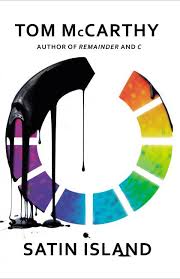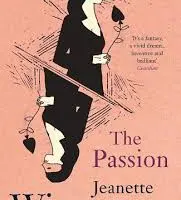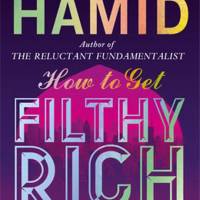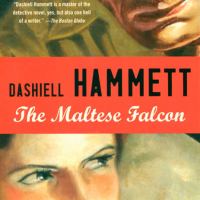Satin Island, by Tom McCarthy
When I started Satin Island I already knew it was Booker-nominated. I’d read multiple glowing reviews, and I remembered absolutely loving McCarthy’s first novel Remainder. Everything then, every authority including my past self, told me that it was a significant book. Perhaps it is, significance after all is a collective judgement. Having finished it though I’m not persuaded it’s a very good book.
U is a corporate anthropologist (“Call me U”), working for “the Company” on the “Koob-Sassen Project” – a project so huge and complex that it will touch the lives of almost everyone in the developed world (perhaps beyond) and yet that will be so subtly pervasive that nobody will even notice it. The Company is a kind of advertising/marketing/strategy consultancy, headed by a gnomic corporate guru whose every sentence seems weighted with meaning and whose every recommendation is received with gravity and respect.
U’s role in the Company is an ambiguous one. Years previously he wrote an anthropological treatise on the club scene, one where he was as much participant as observer, and this brought him to the guru’s attention and now U works in the Company basement putting together files of possible phenomenological observations that somehow transmigrate into sellable product.
Currently U’s obsessed with a possible murder case involving a parachutist whose chute didn’t open. He spots an apparent pattern of similar crimes with similar investigations each unfolding in similar ways but across multiple jurisdictions. At the same time he’s fascinated by a major oil spill and sits absorbed by rolling news footage of the oil blossoming out, coating and transforming all that it touches. McCarthy is good on the curious sterility of modern news reporting and the odd juxtaposition and equal weighting of car bombings, earnings reports and natural disasters:
I popped the news page open as I talked to her. The airspace lock-up was announced halfway down, adjacent to and in the same font-size as the marketplace truck bombing. Above it, slightly larger, the oil spill, with a sequence of photos showing tugs, oil-covered men wrestling with grips and winches, those black-ringed outlying islands, the giant oil-flower and so forth. The editor had chosen a “fade” effect to link the shots together, rather than the more abrupt type of succession that recalls old slideshow carousels. It struck me as the right effect to use, aesthetically speaking.
U himself is a cipher, which is fine because this isn’t a novel of character. He’s a coldly distant narrator fond of a kind of pseudo-French style philosophising which involves a great deal of placing interpretative significance on the world but shows little evidence that any of it has any meaning to anyone beyond those indulging in it. Here’s an example of how that feeds into his work:
I got really into creases. Jeans crease in all kinds of interesting ways: honeycomb, whisker, train-track, stack … I catalogued no fewer than seventeen different crease-types, each of which has slightly different innuendos. To frame these—that is, to provide a framework for explaining to the client what these crease-types truly and profoundly meant—I stole a concept from the French philosopher Deleuze: for him le pli, or fold, describes the way we swallow the exterior world, invert it and then flip it back outwards again, and, in so doing, form our own identity. I took out all the revolutionary shit (Deleuze was a leftie); and I didn’t credit Deleuze, either. Big retail companies don’t want to hear about such characters. I did the same thing with another French philosopher, Badiou: I recycled his notion of a rip, a sudden temporal rupture, and applied it, naturally, to tears worn in jeans, which I presented as the birth-scars of their wearer’s singularity, testaments to the individual’s break with general history, to the successful institution of a personal time. I dropped the radical baggage from that, too (Badiou is virtually Maoist). This pretty much set up the protocol or MO I’d deploy in my work for the Company from then on in: feeding vanguard theory, almost always from the left side of the spectrum, back into the corporate machine. The machine could swallow everything, incorporate it seamlessly, like a giant loom that re-weaves all fabric, no matter how recalcitrant and jarring its raw form, into what my hero would have called a master-pattern—or, if not that, then maybe just the pattern of the master.
As ever, we’re into issues of authenticity. We’re back into the exploration of repetition which McCarthy manages so well in Remainder, and in many ways this novel is itself a repetition of Remainder, save with a less interesting execution. Beyond that, well, just because one can say that ripped jeans represent birth-scars of the wearer’s singularity doesn’t make that interpretation a thing in the world. It’s just words. We could say anything, apply almost any meaning we can create, but the jeans remain the same and I doubt any of it reflects why someone actually buys a pre-ripped pair of jeans.
The difficulty with a novel of ideas is that once you’ve jettisoned character and plot what remains had better be pretty damn good. It’s a common issue in SF, albeit for a very different sort of idea. You want to write a novel about some bizarre implication of contemporary physics, but to sell that to the typical SF fan (in which for these purposes I’d include myself) you need characters and plot.
That by the way is why it’s often a category error to criticise big SF novels for weak characterisation. The characters aren’t the point – they’re just the sugar-coated pill that the big idea sits inside. Take away that sugar coating and the ideas have to sell themselves. That’s McCarthy’s challenge here.
So, the first half of Satin Island is a novel of ideas examining issues of authenticity and the imposition of meaning, narrated by a protagonist who utterly fails to persuade of the validity of his own insights. It’s also a sort of corporate satire, though not a successful one as I got the distinct impression that McCarthy knew as much about modern corporate life as I do the life of Amazonian rain forest tribes. I’ve seen a bit on tv, but I’ve never met anyone from those cultures. On the other hand, it’s not quite the same since I’m aware I know nothing of those people and I don’t write smug books about them.
U refers to “sub-clauses of contracts sitting in the drawers of cabinets” which is a lovely sentence but bears no real resemblance to how things actually work (we have electronic filing these days). The depictions of meetings and workplace conversations seem to owe more to how characters behave in sitcoms than in real offices. None of the work can be described save in the blandest generalities, and while that seems to be intended as satire I found myself wondering if it also reflected a simple ignorance of what most people actually do in their jobs.
Perhaps the best example is the descriptions of the Koob-Sassen Project, which mimic real corporate conversations about how lives will be revolutionised by some new process or design. Unfortunately, I actually work on multi-billion pound projects in real life and while from a distance I can see how it might sometimes sound like nothing real is being discussed that doesn’t make it so. In reality large projects tend to have very concrete anticipated outcomes, and if those don’t materialise very hard questions start to be asked very quickly.
I’m at risk of being a car-enthusiast criticising a Virginia Woolf novel because it references a make of car that didn’t come out until a year after the time in which the novel is set. It’s another form of category error to complain of a novel not getting details right where those details aren’t the focus of the novel. Still, if you’re going to have an element of corporate satire in your book it does help to give the sense that you’ve at least spent a day in an office.
[Edit: After writing this I found a review on a consultancy firm’s blog where they comment on the accuracy of the depiction of their business. I’m not changing what I wrote since I don’t like editing pieces once written, and it remains true that I wasn’t persuaded, but it seemed fair to flag the contradiction. I link to the consultancy piece at the end.]
By about the halfway mark I was very close to abandoning Satin Island, but then McCarthy does something clever. U gives a Ted talk in which he waffles on in his usual unconvincing fashion about issues in contemporary anthropology, and something wonderful happens:
To understand that question fully, though (I concluded), what we require is not contemporary anthropology but rather an anthropology of The Contemporary. Ba-boom: that was my “out”. My talk was met with silence, then, when my audience realized that I’d finished, a smattering of polite clapping. No one approached me to discuss it afterwards. Later that evening, in the “wet” or Turkish sauna, I recognized one of the other delegates. He recognized me too, but broke off eye-contact immediately before slipping away into the steam.
Until that point, I’d taken U largely at face value. Suddenly it became apparent however that within the fiction others had much the same reaction as I did. U spent his 15 minutes on stage saying nothing that means anything, and the audience recognised that, which means that McCarthy recognises it and which means U isn’t to be trusted. If that’s the case then U’s patterns, his borrowings from French philosophers and impositions of meaning, none of it can be trusted.
Soon U is fantasising about how his talk might have been received; about the talk he might have given and how he would verbally crush a dissenter and win rapturous acclaim from all present. It’s a bit pathetic, and as it marks a return to U’s uninterrupted voice it resonates with most of what’s gone before and calls it all into question. Since U is the narrator he’s able to present each of his ideas as being somehow incisive and intelligent, but it’s not at all clear that anyone agrees with him save possibly his boss (and even he seems to regard U primarily as a form of corporate mascot).
With that I read on with renewed interest, but as I did so I ran into another difficulty. Satin Island is a novel of ideas in which the vehicle for those ideas himself undermines them by his own unpersuasive advocacy. It becomes terribly meta, as we’re examining questions of authenticity through a character who is himself inauthentic, both in that he’s (intentionally) not a convincingly drawn human being and in that even to others in the novel he’s quite evidently talking bollocks. That’s clever, but I’m not sure it’s interesting.
In his fantasy Ted talk U says “Nature is senseless.” That’s true. U’s boss commissions him to write a great report; a definitive anthropology of our age. It’s no spoiler to say that the task is impossible. U is trying to capture reality in words, and the task is beyond him (Lee Rourke grapples with the same idea to an extent, though for me more successfully, in his Vulgar Things). U philosophises, finds apparent patterns, interprets, but none of it means anything because beneath it all the raw stuff of reality just continues.
If you wished you could read say the Deepwater Horizon spill as a metaphor for how capitalist realism consumes and transforms our relationship with the natural world, drowning the real in the commercial. Perhaps that metaphor might be useful in some contexts, but it doesn’t save a single bird or fish. We can describe the world however we like, but if we confuse our descriptions for the thing itself we commit a worse category error than any of the others I’ve mentioned so far in this piece.
Where does that leave me? The second half of Satin Island undermines and validates the first, making the whole a much better book than its (initially disappointing) parts. For all that though, McCarthy already wrote a better book on these issues and there’s nothing he does here that he didn’t do better in Remainder. I don’t regret reading Satin Island because McCarthy can write and because at his best he does capture something of the strangeness of our age, but so does William Gibson and frankly I think Gibson does it better.
Other reviews
While this had massive press attention (generally favourable, save the FT which was much closer to my take), I don’t think it’s received quite the same interest from the blogosphere. In fairness, if I were McCarthy that’s the way round I’d want it. David Hebblethwaite wrote a couple of short pieces on it, one of which is here. Trever Berrett of the ever-reliable mookseandthegripes blog (which desperately, desperately needs a search box Trevor) writes a fairly favourable review here, though I note that he says he admired it more than he loved it. I’m sure I’ve missed others, so please alert me to them as usual in the comments.
Edit: I also found this review from what I think is a consultancy firm’s blog, which is much more positive than I am about the depiction of the corporate environment. Perhaps then McCarthy does know what he’s talking about in terms of this world, and it’s me that’s wrong in extrapolating from my different form of advisory business experience. To be fair to McCarthy this seems to be a real outfit, and yet their mission statement reads “River dives in to the trends, needs, experiences and expectations of consumers. We use these immersion platforms to create new opportunities for our clients’ products and brands” which I suspect wouldn’t look out of place in U’s Company. Also, in fairness to McCarthy, after poking around their site for a bit I honestly couldn’t tell you what they actually do.
If anyone reading this is wondering why I didn’t make any comparison with DeLillo, it’s because I’ve only read one DeLillo and only know there are comparisons to be made because people have mentioned it to me. The comparisons tend to be unfavourable.
Finally, I received this as a free review copy from netgalley. I don’t think however that inclined me to be unduly kind to it.














I haven’t been tempted to read this. I was put off by the blurbs more than anything else. I thought it sounded a bit pretentious to be honest…
I think one could easily find it that way Guy.
I am planning to read this – because I have worked in the consultancy field and have studied anthropology, so I think all this satire of pretentiousness (if it is indeed a satire) would be right up my street. I’ll let you know if it resembles the corporate world I know once I’ve read it, but thank you for your very thoughtful, thorough and generous review, encompassing all those different points of view as well.
Excellent. That consultancy review did make me wonder if I was just wrong about the inaccuracy of the depiction of the corporate world, though it remains an issue if it’s correct but he didn’t persuade of its correctness. Anyway, particularly given your background I’d love to see your thoughts.
I always end up writing more when I have an issue with a book. It seems only fair if you’re going to criticise to do your best to actually set out your criticisms.
I read so many positive reviews/articles on this book, but unfortunately I only made it about a quarter of the way through (and I hate giving up on books). For some reason I can’t put my finger on, I just couldn’t get in to it. When I was reading I felt, like you say, that it was a significant book and the ideas were interesting but I felt quite disengaged with it. Perhaps I was reading it at the wrong time; I’d be interested to try it again at some point. I really enjoyed reading your review 🙂
Gemma, thanks!
I think it’s significant basically just because everyone says it is and so that makes it so. It’s self-fulfilling. If it were by a new author without the weight of expectation I’m not persuaded it would be significant purely on its own merits.
If I hadn’t had a review copy and previously enjoyed one of his books I’d likely have bailed myself. It does help a lot when you get to the Ted talk and realise that within the fiction people find U insufferable too. It’s a claustrophobic book though, a tightly constrained and cold world and there are times one can just bounce off that as a reader.
The ideas are interesting, but query if that’s enough? Ideas make a great essay, but I’d query whether they can carry a novel without some other architecture around them. That needn’t be plot, it needn’t be character, it can be just the writing, but it has to be something.
Crazy Max — my blog does have a search box! . . . it’s just hard to see up there in the upper right-hand corner. But, even better, I have a comprehensive index!
Like Guy, I haven’t been tempted to read this novel (and your very thoughtful review convinces me that it’s not my kind of read). Also, I was put off by a pretty negative review of it on Radio 4’s Saturday Review programme. There’s link here if it’s of interest – the clip starts at roughly 18min into the programme.
http://www.bbc.co.uk/programmes/b055ddkd
I’d move it Trevor. I just looked right now and I still can’t see it. You’re right though, I’d missed how good the index is, that is a very nice feature.
Anyway, I only say these things because I regularly want to search your blog – it’s one I always go to so as to see if you’ve discussed something I’m posting about (if it’s something serious anyway, I don’t if it’s SF or crime so much since that’s generally not your beat). I wasn’t trying to make a dig – I’m very fond of your blog.
I do think that I will start with Remainder as per your recommendation. I have encountered a few negative reviews on blogs, but I still think that, if I like his writing, this may end up in my TBR. My own background in Anthropology raises my interest and I do like a challenge. That said, you have given the book a fair, critical review which is always the most informative, useful approach for any potential reader.
I’ll look for ways to move it, Max — and no worries on my end! No offense taken, for sure — hope I didn’t come across as if that were the case, because that was far from my mind!
Ellis Sharp has published a novel in response to McCarthy’s – see http://www.amazon.co.uk/gp/aw/d/1910858048/ref=mp_s_a_1_1?qid=1449696542&sr=8-1&keywords=lamees+najim.
I’ve not yet read McCarthy, & no doubt will some day, but he’s not high on my list. I do like a review like this one that doesn’t just gush unreflectingly. I’m also reluctant to abandon a novel once started, but am close to doing so with the Modiano ‘Occupation’ trilogy, which just isn’t engaging me.
This wound up being my second worst read for 2015 after ‘Lurid & Cute’ by Adam Thirlwell. McCarthy just dropped the Great Report after building it up so much.
I reviewed it here: http://mondyboy.com/?p=7731
I loved it – especially the second half, but then I haven’t read Remainder.
My co-host, Kirstyn McDermott, and I will also be discussing the novel on the next episode of Writer and the Critic which records on the weekend. I have no idea what she thought of it…
Rough, a background in anthropology will give you a different level of insight I’d have thought. I’d be very interested to see your thoughts, so I hope you do try it at some point.
Macdonald, interesting. There’s no info really at the Amazon site. What prompted the response?
Simon, I think where one is basically saying that a novel’s not that good one at least owes the author a decent stab at how you reached that view. Also, others may (and do) differ, so I’m hoping to give enough info that someone can say “actually, that sounds pretty interesting to me”. My negative reviews are almost always longer than my positive ones in consequence, and take longer to write…
Tony, did you blog it? I’ll have a dig around yours.
Ian, thanks, I’ll take a look. I always welcome countervailing views. It makes things so much more interesting.
Tony’s review, for the curious, is here: https://anokatony.wordpress.com/2015/06/04/satin-island-by-tom-mccarthy-not-oprah-literature/
I should have remembered it given I commented on it…
Am yet to be sold on trying McCarthy, and this ain’t the book that’s going to do it.
The basic premise sounds so nonsensical that it seems hardly worth debating whether McCarthy has created a realistic view, or even a viable satire, of the corporate world he locates the book in. Maybe I’m being unfair to him, but the excerpts and accounts of the book I’ve seen (including the ones you quote) come across as either laziness or a failure of imagination.
Amusing that you found an actual corporate blog review. Looking at the site, they seem to be some kind of digital consultancy – essentially a jazzed up marketing / PR crossover. Not grown-up consulting. (Miaow.)
Yes, I did wonder a bit about that part of my piece. As I said above, there comes a point where focusing on credibility is just spectacularly missing the point. Then again, just because the book doesn’t treat it as an issue doesn’t mean it can’t become one.
I loved the corporate blog review; I was really pleased to have found that.
Given that satire has to distort, where did McCarthy go wrong with his take on the corporate scene? Wrong targets? A fundamental misstep with how your work environment functions? I actually think it is rather important for the author to do his homework throughout. Otherwise, innocents like me can be left with the wrong end of the stick. A novel has authority. I’m curious, just how badly did he fumble? Oh, and good luck with your latest multi-billion pound project. What does a billion pounds look like? Can I fit it into my rucksack? I have strong shoulders.
In my case he just didn’t persuade me he knew his target well enough to credibly satirise it, though clearly the consultancy review disagreed with me.
I realised afterwards the billion pound thing might sound like boasting, but I didn’t mean it that way. The asset class I work with (infrastructure) has huge deal values typically, it doesn’t however make me more skilled or special than colleagues who deal in different asset categories, and it certainly doesn’t make my job any more important than others (I don’t work with patients, children or anything like that which is clearly more important). Mostly it impacts deal timetables. I have never seen, and never will see, a billion quid in the flesh.
Oh, also on the subject of job importance, when I unexpectedly injured my back and was off work for six weeks with no notice a couple of years back, the world carried on untroubled and after a couple of days so did all the deals I was working on…
Actually, I never thought you were boasting. Job importance can be calculated on many factors, one of them being pressure. Nothing quite says pressure like a billion pounds. You just had me curious about McCarthy’s mistakes in portraying the corporate world. Mostly because I just don’t have that kind of mind for that kind of job. So when I read a novel that utilises high finance I have trouble trusting/following myself let alone the author. As for not being indispensable, we’re all there. And on reflection, it’s a relief. Merry Xmas and try not to clock the new seasonal Kellogs corn flakes packet. The toothless Santa is very worrying . .
That sounds rather complicated and I am reminded of a little of Ballard. I am not all that keen on novels which include a strong theme of corporatism, so may not explore this one further but your excellent review certainly gives me very worthwhile synopsis
I’m glad I missed the toothless Santa, I suspect that made for a merrier Christmas…
Tom, there is a Ballardian element certainly, though to be honest I prefer Ballard. There’s definitely a strong corporate theme, so I suspect this one’s not for you.
I read this over Christmas and did not enjoy it. I haven’t read anything else by him either, so had nothing to compare this work against. Completely agree with your summing up of the narrator as “a protagonist who utterly fails to persuade of the validity of his own insights”
It is a bit of a slog in places isn’t it? Some loved it, but not me and clearly not you.
I definitely wanted to like this novel, as the conceit of a person better suited to life in the ivory tower (academia) working at a consultancy has some appeal for me. (It’s sort of the story of my life.) However, McCarthy’s insistence on keeping the character as cipher-like as possible is annoying, pretentious and not even particularly novel, as you note. I rail against what I consider sterile (and tedious) novels in this blog post: http://erics-hangout.blogspot.ca/2015/05/against-sterile-art.html
Even when we think there will be some positive motion in the second half of the book (as he goes off on some business trip), this seems pretty empty. I will admit I find it sort of amusing that there is this big build up to him going on the Staten Island Ferry only to turn around without setting foot on Staten Island. (I did the exact same thing once in my youth, thinking that the journey was far more fun than the destination.) Anyway, Satin Island was certainly somewhere in the bottom 10-15 books I read in 2015, though it was still marginally more rewarding than Ben Lerner’s 10:04.
Sterile isn’t unfair here I think. That said, it’s not of course a novel concerned with character. It’s more like much SF, about the idea with the character really a vehicle for the idea.
Did you read Lerner’s Leaving the Atocha Station? I liked it, but I seem to be in a minority and do sometimes wonder if I was right.
I have not read the Atocha Station book. I was so turned off by Lerner’s remarks on contemporary fiction. He doesn’t quite come out and say that readers who still want plot and meaningful characters are saps, but he comes very close. So on principle, I will not read any of his other works (unless he retracts his position some day).
I do like your blog quite a bit. I think it admirable that you review every book you are reading. I make serious reviews of perhaps 20% of the books I read and perhaps allude to another 20% through posts where I group books together and discuss linkages across novels. But many books I have read I let sink with almost no trace.
Eric, there’s a fair few authors who I think one should never read interviews of. Oddly enough king of them for me is Tom McCarthy, who is an absolutely insufferable interviewee. Every time he gives an interview I suspect he loses potential readers. Some authors are perhaps best letting their works speak for them. It doesn’t surprise me Lerner is one of those.
Plot and meaningful characters aren’t for every book, but they are incredibly powerful things. Story is a powerful thing. That old standard, a good story well told, is still what most readers want most of the time and much as I love a lot of modernist fiction I don’t think I’d exclude myself from that (though I’d argue that a lot of the best modernist fiction actually is that, just using different stylistic techniques).
Thanks for the kind words on the blog. I have missed a few over the years, usually when I just got too far behind to keep up with reviews, but not many. Sadly the ones missed were particularly good – it wasn’t a quality issue – and include the Lattimore translation of the Illiad. I hope to get back to them some day.
It’s the negative reviews that are hard to write, they always take much longer than the positive ones. Books that sink without trace are even worse. What is there after all to say?
Out of interest, I note you’re on blogpost. I tend to find blogs on that platform quite hard to follow in terms of new post alerts and new comment alerts. Have you got round that issue or not encountered it?
I wonder if some of these authors are longing for a mythical era when they didn’t have to demean themselves by flogging their wares on book tours or in interviews. That is perhaps unduly harsh, but I definitely get the sense that some authors do not want to lose their “cred” by becoming popular.
In terms of my blog, I haven’t had any problem finding out about new comments, since I monitor them closely, though it is possible that others are not getting notification. I have so few followers that I really don’t know if they are or are not getting notification about new posts. I might look into changing platforms at some point, but it seems to be working ok for the moment.
I don’t know why but reading your review, the book reminds me of The Crying of Lot 49.
I’ll pass on this one, I’m almost sure I’d abandon it.
So far, nobody beats Max Barry and Delphine de Vigan in describing corporate life. Both are former executives, I suppose it helps.
It’s not nearly that good. I suspect my saying that doesn’t make you any more likely to read this…
I don’t think you’d enjoy it. And yes, knowledge helps. I wasn’t persuaded here that he knew the corporate environment he was describing, which is a common issue when authors who’ve never worked at any meaningful level in a company try to describe what it’s like.
Pingback: Certainty backslides into probability. Information transmission, it emerges, is about doing the best you can. | Pechorin's Journal